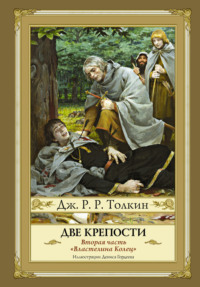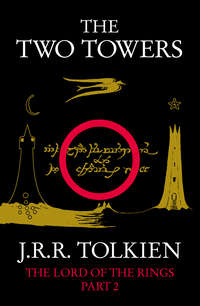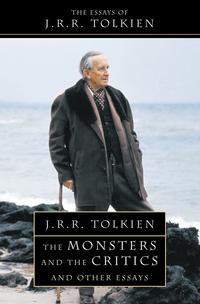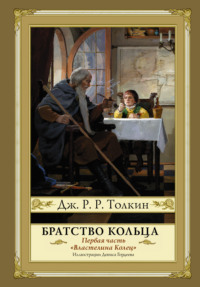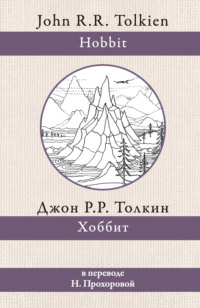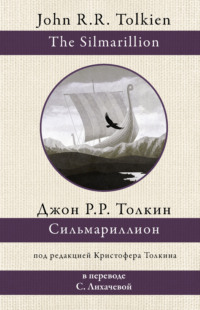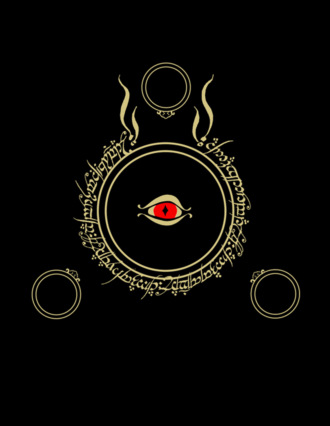
Полная версия
The Lord of the Rings: The Fellowship of the Ring, The Two Towers, The Return of the King
‘Behind that there was something else at work, beyond any design of the Ring-maker. I can put it no plainer than by saying that Bilbo was meant to find the Ring, and not by its maker. In which case you also were meant to have it. And that may be an encouraging thought.’
‘It is not,’ said Frodo. ‘Though I am not sure that I understand you. But how have you learned all this about the Ring, and about Gollum? Do you really know it all, or are you just guessing still?’
Gandalf looked at Frodo, and his eyes glinted. ‘I knew much and I have learned much,’ he answered. ‘But I am not going to give an account of all my doings to you. The history of Elendil and Isildur and the One Ring is known to all the Wise. Your ring is shown to be that One Ring by the fire-writing alone, apart from any other evidence.’
‘And when did you discover that?’ asked Frodo, interrupting.
‘Just now in this room, of course,’ answered the wizard sharply. ‘But I expected to find it. I have come back from dark journeys and long search to make that final test. It is the last proof, and all is now only too clear. Making out Gollum’s part, and fitting it into the gap in the history, required some thought. I may have started with guesses about Gollum, but I am not guessing now. I know. I have seen him.’
‘You have seen Gollum?’ exclaimed Frodo in amazement.
‘Yes. The obvious thing to do, of course, if one could. I tried long ago; but I have managed it at last.’
‘Then what happened after Bilbo escaped from him? Do you know that?’
‘Not so clearly. What I have told you is what Gollum was willing to tell – though not, of course, in the way I have reported it. Gollum is a liar, and you have to sift his words. For instance, he called the Ring his “birthday-present”, and he stuck to that. He said it came from his grandmother, who had lots of beautiful things of that kind. A ridiculous story. I have no doubt that Sméagol’s grandmother was a matriarch, a great person in her way, but to talk of her possessing many Elven-rings was absurd, and as for giving them away, it was a lie. But a lie with a grain of truth.
‘The murder of Déagol haunted Gollum, and he had made up a defence, repeating it to his “Precious” over and over again, as he gnawed bones in the dark, until he almost believed it. It was his birthday. Déagol ought to have given the ring to him. It had obviously turned up just so as to be a present. It was his birthday-present, and so on, and on.
‘I endured him as long as I could, but the truth was desperately important, and in the end I had to be harsh. I put the fear of fire on him, and wrung the true story out of him, bit by bit, together with much snivelling and snarling. He thought he was misunderstood and ill-used. But when he had at last told me his history, as far as the end of the Riddle-game and Bilbo’s escape, he would not say any more, except in dark hints. Some other fear was on him greater than mine. He muttered that he was going to get his own back. People would see if he would stand being kicked, and driven into a hole and then robbed. Gollum had good friends now, good friends and very strong. They would help him. Baggins would pay for it. That was his chief thought. He hated Bilbo and cursed his name. What is more, he knew where he came from.’
‘But how did he find that out?’ asked Frodo.
‘Well, as for the name, Bilbo very foolishly told Gollum himself; and after that it would not be difficult to discover his country, once Gollum came out. Oh yes, he came out. His longing for the Ring proved stronger than his fear of the Orcs, or even of the light. After a year or two he left the mountains. You see, though still bound by desire of it, the Ring was no longer devouring him; he began to revive a little. He felt old, terribly old, yet less timid, and he was mortally hungry.
‘Light, light of Sun and Moon, he still feared and hated, and he always will, I think; but he was cunning. He found he could hide from daylight and moonshine, and make his way swiftly and softly by dead of night with his pale cold eyes, and catch small frightened or unwary things. He grew stronger and bolder with new food and new air. He found his way into Mirkwood, as one would expect.’
‘Is that where you found him?’ asked Frodo.
‘I saw him there,’ answered Gandalf, ‘but before that he had wandered far, following Bilbo’s trail. It was difficult to learn anything from him for certain, for his talk was constantly interrupted by curses and threats. “What had it got in its pocketses?” he said. “It wouldn’t say, no precious. Little cheat. Not a fair question. It cheated first, it did. It broke the rules. We ought to have squeezed it, yes precious. And we will, precious!”
‘That is a sample of his talk. I don’t suppose you want any more. I had weary days of it. But from hints dropped among the snarls I gathered that his padding feet had taken him at last to Esgaroth, and even to the streets of Dale, listening secretly and peering. Well, the news of the great events went far and wide in Wilderland, and many had heard Bilbo’s name and knew where he came from. We had made no secret of our return journey to his home in the West. Gollum’s sharp ears would soon learn what he wanted.’
‘Then why didn’t he track Bilbo further?’ asked Frodo. ‘Why didn’t he come to the Shire?’
‘Ah,’ said Gandalf, ‘now we come to it. I think Gollum tried to. He set out and came back westward, as far as the Great River. But then he turned aside. He was not daunted by the distance, I am sure. No, something else drew him away. So my friends think, those that hunted him for me.
‘The Wood-elves tracked him first, an easy task for them, for his trail was still fresh then. Through Mirkwood and back again it led them, though they never caught him. The wood was full of the rumour of him, dreadful tales even among beasts and birds. The Woodmen said that there was some new terror abroad, a ghost that drank blood. It climbed trees to find nests; it crept into holes to find the young; it slipped through windows to find cradles.
‘But at the western edge of Mirkwood the trail turned away. It wandered off southwards and passed out of the Wood-elves’ ken, and was lost. And then I made a great mistake. Yes, Frodo, and not the first; though I fear it may prove the worst. I let the matter be. I let him go; for I had much else to think of at that time, and I still trusted the lore of Saruman.
‘Well, that was years ago. I have paid for it since with many dark and dangerous days. The trail was long cold when I took it up again, after Bilbo left here. And my search would have been in vain, but for the help that I had from a friend: Aragorn, the greatest traveller and huntsman of this age of the world. Together we sought for Gollum down the whole length of Wilderland, without hope, and without success. But at last, when I had given up the chase and turned to other paths, Gollum was found. My friend returned out of great perils bringing the miserable creature with him.
‘What he had been doing he would not say. He only wept and called us cruel, with many a gollum in his throat; and when we pressed him he whined and cringed, and rubbed his long hands, licking his fingers as if they pained him, as if he remembered some old torture. But I am afraid there is no possible doubt: he had made his slow, sneaking way, step by step, mile by mile, south, down at last to the Land of Mordor.’
A heavy silence fell in the room. Frodo could hear his heart beating. Even outside everything seemed still. No sound of Sam’s shears could now be heard.
‘Yes, to Mordor,’ said Gandalf. ‘Alas! Mordor draws all wicked things, and the Dark Power was bending all its will to gather them there. The Ring of the Enemy would leave its mark, too, leave him open to the summons. And all folk were whispering then of the new Shadow in the South, and its hatred of the West. There were his fine new friends, who would help him in his revenge!
‘Wretched fool! In that land he would learn much, too much for his comfort. And sooner or later as he lurked and pried on the borders he would be caught, and taken – for examination. That was the way of it, I fear. When he was found he had already been there long, and was on his way back. On some errand of mischief. But that does not matter much now. His worst mischief was done.
‘Yes, alas! through him the Enemy has learned that the One has been found again. He knows where Isildur fell. He knows where Gollum found his ring. He knows that it is a Great Ring, for it gave long life. He knows that it is not one of the Three, for they have never been lost, and they endure no evil. He knows that it is not one of the Seven, or the Nine, for they are accounted for. He knows that it is the One. And he has at last heard, I think, of hobbits and the Shire.
‘The Shire – he may be seeking for it now, if he has not already found out where it lies. Indeed, Frodo, I fear that he may even think that the long-unnoticed name of Baggins has become important.’
‘But this is terrible!’ cried Frodo. ‘Far worse than the worst that I imagined from your hints and warnings. O Gandalf, best of friends, what am I to do? For now I am really afraid. What am I to do? What a pity that Bilbo did not stab that vile creature, when he had a chance!’
‘Pity? It was Pity that stayed his hand. Pity, and Mercy: not to strike without need. And he has been well rewarded, Frodo. Be sure that he took so little hurt from the evil, and escaped in the end, because he began his ownership of the Ring so. With Pity.’
‘I am sorry,’ said Frodo. ‘But I am frightened; and I do not feel any pity for Gollum.’
‘You have not seen him,’ Gandalf broke in.
‘No, and I don’t want to,’ said Frodo. ‘I can’t understand you. Do you mean to say that you, and the Elves, have let him live on after all those horrible deeds? Now at any rate he is as bad as an Orc, and just an enemy. He deserves death.’
‘Deserves it! I daresay he does. Many that live deserve death. And some that die deserve life. Can you give it to them? Then do not be too eager to deal out death in judgement. For even the very wise cannot see all ends. I have not much hope that Gollum can be cured before he dies, but there is a chance of it. And he is bound up with the fate of the Ring. My heart tells me that he has some part to play yet, for good or ill, before the end; and when that comes, the pity of Bilbo may rule the fate of many – yours not least. In any case we did not kill him: he is very old and very wretched. The Wood-elves have him in prison, but they treat him with such kindness as they can find in their wise hearts.’
‘All the same,’ said Frodo, ‘even if Bilbo could not kill Gollum, I wish he had not kept the Ring. I wish he had never found it, and that I had not got it! Why did you let me keep it? Why didn’t you make me throw it away, or, or destroy it?’
‘Let you? Make you?’ said the wizard. ‘Haven’t you been listening to all that I have said? You are not thinking of what you are saying. But as for throwing it away, that was obviously wrong. These Rings have a way of being found. In evil hands it might have done great evil. Worst of all, it might have fallen into the hands of the Enemy. Indeed it certainly would; for this is the One, and he is exerting all his power to find it or draw it to himself.
‘Of course, my dear Frodo, it was dangerous for you; and that has troubled me deeply. But there was so much at stake that I had to take some risk – though even when I was far away there has never been a day when the Shire has not been guarded by watchful eyes. As long as you never used it, I did not think that the Ring would have any lasting effect on you, not for evil, not at any rate for a very long time. And you must remember that nine years ago, when I last saw you, I still knew little for certain.’
‘But why not destroy it, as you say should have been done long ago?’ cried Frodo again. ‘If you had warned me, or even sent me a message, I would have done away with it.’
‘Would you? How would you do that? Have you ever tried?’
‘No. But I suppose one could hammer it or melt it.’
‘Try!’ said Gandalf. ‘Try now!’
Frodo drew the Ring out of his pocket again and looked at it. It now appeared plain and smooth, without mark or device that he could see. The gold looked very fair and pure, and Frodo thought how rich and beautiful was its colour, how perfect was its roundness. It was an admirable thing and altogether precious. When he took it out he had intended to fling it from him into the very hottest part of the fire. But he found now that he could not do so, not without a great struggle. He weighed the Ring in his hand, hesitating, and forcing himself to remember all that Gandalf had told him; and then with an effort of will he made a movement, as if to cast it away – but he found that he had put it back in his pocket.
Gandalf laughed grimly. ‘You see? Already you too, Frodo, cannot easily let it go, nor will to damage it. And I could not “make” you – except by force, which would break your mind. But as for breaking the Ring, force is useless. Even if you took it and struck it with a heavy sledge-hammer, it would make no dint in it. It cannot be unmade by your hands, or by mine.
‘Your small fire, of course, would not melt even ordinary gold. This Ring has already passed through it unscathed, and even unheated. But there is no smith’s forge in this Shire that could change it at all. Not even the anvils and furnaces of the Dwarves could do that. It has been said that dragon-fire could melt and consume the Rings of Power, but there is not now any dragon left on earth in which the old fire is hot enough; nor was there ever any dragon, not even Ancalagon the Black, who could have harmed the One Ring, the Ruling Ring, for that was made by Sauron himself.
‘There is only one way: to find the Cracks of Doom in the depths of Orodruin, the Fire-mountain, and cast the Ring in there, if you really wish to destroy it, to put it beyond the grasp of the Enemy for ever.’
‘I do really wish to destroy it!’ cried Frodo. ‘Or, well, to have it destroyed. I am not made for perilous quests. I wish I had never seen the Ring! Why did it come to me? Why was I chosen?’
‘Such questions cannot be answered,’ said Gandalf. ‘You may be sure that it was not for any merit that others do not possess: not for power or wisdom, at any rate. But you have been chosen, and you must therefore use such strength and heart and wits as you have.’
‘But I have so little of any of these things! You are wise and powerful. Will you not take the Ring?’
‘No!’ cried Gandalf, springing to his feet. ‘With that power I should have power too great and terrible. And over me the Ring would gain a power still greater and more deadly.’ His eyes flashed and his face was lit as by a fire within. ‘Do not tempt me! For I do not wish to become like the Dark Lord himself. Yet the way of the Ring to my heart is by pity, pity for weakness and the desire of strength to do good. Do not tempt me! I dare not take it, not even to keep it safe, unused. The wish to wield it would be too great for my strength. I shall have such need of it. Great perils lie before me.’
He went to the window and drew aside the curtains and the shutters. Sunlight streamed back again into the room. Sam passed along the path outside whistling. ‘And now,’ said the wizard, turning back to Frodo, ‘the decision lies with you. But I will always help you.’ He laid his hand on Frodo’s shoulder. ‘I will help you bear this burden, as long as it is yours to bear. But we must do something, soon. The Enemy is moving.’
There was a long silence. Gandalf sat down again and puffed at his pipe, as if lost in thought. His eyes seemed closed, but under the lids he was watching Frodo intently. Frodo gazed fixedly at the red embers on the hearth, until they filled all his vision, and he seemed to be looking down into profound wells of fire. He was thinking of the fabled Cracks of Doom and the terror of the Fiery Mountain.
‘Well!’ said Gandalf at last. ‘What are you thinking about? Have you decided what to do?’
‘No!’ answered Frodo, coming back to himself out of darkness, and finding to his surprise that it was not dark, and that out of the window he could see the sunlit garden. ‘Or perhaps, yes. As far as I understand what you have said, I suppose I must keep the Ring and guard it, at least for the present, whatever it may do to me.’
‘Whatever it may do, it will be slow, slow to evil, if you keep it with that purpose,’ said Gandalf.
‘I hope so,’ said Frodo. ‘But I hope that you may find some other better keeper soon. But in the meanwhile it seems that I am a danger, a danger to all that live near me. I cannot keep the Ring and stay here. I ought to leave Bag End, leave the Shire, leave everything and go away.’ He sighed.
‘I should like to save the Shire, if I could – though there have been times when I thought the inhabitants too stupid and dull for words, and have felt that an earthquake or an invasion of dragons might be good for them. But I don’t feel like that now. I feel that as long as the Shire lies behind, safe and comfortable, I shall find wandering more bearable: I shall know that somewhere there is a firm foothold, even if my feet cannot stand there again.
‘Of course, I have sometimes thought of going away, but I imagined that as a kind of holiday, a series of adventures like Bilbo’s or better, ending in peace. But this would mean exile, a flight from danger into danger, drawing it after me. And I suppose I must go alone, if I am to do that and save the Shire. But I feel very small, and very uprooted, and well – desperate. The Enemy is so strong and terrible.’
He did not tell Gandalf, but as he was speaking a great desire to follow Bilbo flamed up in his heart – to follow Bilbo, and even perhaps to find him again. It was so strong that it overcame his fear: he could almost have run out there and then down the road without his hat, as Bilbo had done on a similar morning long ago.
‘My dear Frodo!’ exclaimed Gandalf. ‘Hobbits really are amazing creatures, as I have said before. You can learn all that there is to know about their ways in a month, and yet after a hundred years they can still surprise you at a pinch. I hardly expected to get such an answer, not even from you. But Bilbo made no mistake in choosing his heir, though he little thought how important it would prove. I am afraid you are right. The Ring will not be able to stay hidden in the Shire much longer; and for your own sake, as well as for others, you will have to go, and leave the name of Baggins behind you. That name will not be safe to have, outside the Shire or in the Wild. I will give you a travelling name now. When you go, go as Mr. Underhill.
‘But I don’t think you need go alone. Not if you know of anyone you can trust, and who would be willing to go by your side – and that you would be willing to take into unknown perils. But if you look for a companion, be careful in choosing! And be careful of what you say, even to your closest friends! The enemy has many spies and many ways of hearing.’
Suddenly he stopped as if listening. Frodo became aware that all was very quiet, inside and outside. Gandalf crept to one side of the window. Then with a dart he sprang to the sill, and thrust a long arm out and downwards. There was a squawk, and up came Sam Gamgee’s curly head hauled by one ear.
‘Well, well, bless my beard!’ said Gandalf. ‘Sam Gamgee is it? Now what may you be doing?’
‘Lor bless you, Mr. Gandalf, sir!’ said Sam. ‘Nothing! Leastways I was just trimming the grass-border under the window, if you follow me.’ He picked up his shears and exhibited them as evidence.
‘I don’t,’ said Gandalf grimly. ‘It is some time since I last heard the sound of your shears. How long have you been eavesdropping?’
‘Eavesdropping, sir? I don’t follow you, begging your pardon. There ain’t no eaves at Bag End, and that’s a fact.’
‘Don’t be a fool! What have you heard, and why did you listen?’ Gandalf’s eyes flashed and his brows stuck out like bristles.
‘Mr. Frodo, sir!’ cried Sam quaking. ‘Don’t let him hurt me, sir! Don’t let him turn me into anything unnatural! My old dad would take on so. I meant no harm, on my honour, sir!’
‘He won’t hurt you,’ said Frodo, hardly able to keep from laughing, although he was himself startled and rather puzzled. ‘He knows, as well as I do, that you mean no harm. But just you up and answer his questions straight away!’
‘Well, sir,’ said Sam dithering a little. ‘I heard a deal that I didn’t rightly understand, about an enemy, and rings, and Mr. Bilbo, sir, and dragons, and a fiery mountain, and – and Elves, sir. I listened because I couldn’t help myself, if you know what I mean. Lor bless me, sir, but I do love tales of that sort. And I believe them too, whatever Ted may say. Elves, sir! I would dearly love to see them. Couldn’t you take me to see Elves, sir, when you go?’
Suddenly Gandalf laughed. ‘Come inside!’ he shouted, and putting out both his arms he lifted the astonished Sam, shears, grass-clippings and all, right through the window and stood him on the floor. ‘Take you to see Elves, eh?’ he said, eyeing Sam closely, but with a smile flickering on his face. ‘So you heard that Mr. Frodo is going away?’
‘I did, sir. And that’s why I choked: which you heard seemingly. I tried not to, sir, but it burst out of me: I was so upset.’
‘It can’t be helped, Sam,’ said Frodo sadly. He had suddenly realized that flying from the Shire would mean more painful partings than merely saying farewell to the familiar comforts of Bag End. ‘I shall have to go. But’ – and here he looked hard at Sam – ‘if you really care about me, you will keep that dead secret. See? If you don’t, if you even breathe a word of what you’ve heard here, then I hope Gandalf will turn you into a spotted toad and fill the garden full of grass-snakes.’
Sam fell on his knees, trembling. ‘Get up, Sam!’ said Gandalf. ‘I have thought of something better than that. Something to shut your mouth, and punish you properly for listening. You shall go away with Mr. Frodo!’
‘Me, sir!’ cried Sam, springing up like a dog invited for a walk. ‘Me go and see Elves and all! Hooray!’ he shouted, and then burst into tears.
Chapter 3 THREE IS COMPANY
‘You ought to go quietly, and you ought to go soon,’ said Gandalf. Two or three weeks had passed, and still Frodo made no sign of getting ready to go.
‘I know. But it is difficult to do both,’ he objected. ‘If I just vanish like Bilbo, the tale will be all over the Shire in no time.’
‘Of course you mustn’t vanish!’ said Gandalf. ‘That wouldn’t do at all! I said soon, not instantly. If you can think of any way of slipping out of the Shire without its being generally known, it will be worth a little delay. But you must not delay too long.’
‘What about the autumn, on or after Our Birthday?’ asked Frodo. ‘I think I could probably make some arrangements by then.’
To tell the truth, he was very reluctant to start, now that it had come to the point: Bag End seemed a more desirable residence than it had for years, and he wanted to savour as much as he could of his last summer in the Shire. When autumn came, he knew that part at least of his heart would think more kindly of journeying, as it always did at that season. He had indeed privately made up his mind to leave on his fiftieth birthday: Bilbo’s one hundred and twenty-eighth. It seemed somehow the proper day on which to set out and follow him. Following Bilbo was uppermost in his mind, and the one thing that made the thought of leaving bearable. He thought as little as possible about the Ring, and where it might lead him in the end. But he did not tell all his thoughts to Gandalf. What the wizard guessed was always difficult to tell.
He looked at Frodo and smiled. ‘Very well,’ he said. ‘I think that will do – but it must not be any later. I am getting very anxious. In the meanwhile, do take care, and don’t let out any hint of where you are going! And see that Sam Gamgee does not talk. If he does, I really shall turn him into a toad.’
‘As for where I am going,’ said Frodo, ‘it would be difficult to give that away, for I have no clear idea myself, yet.’
‘Don’t be absurd!’ said Gandalf. ‘I am not warning you against leaving an address at the post-office! But you are leaving the Shire – and that should not be known, until you are far away. And you must go, or at least set out, either North, South, West or East – and the direction should certainly not be known.’


